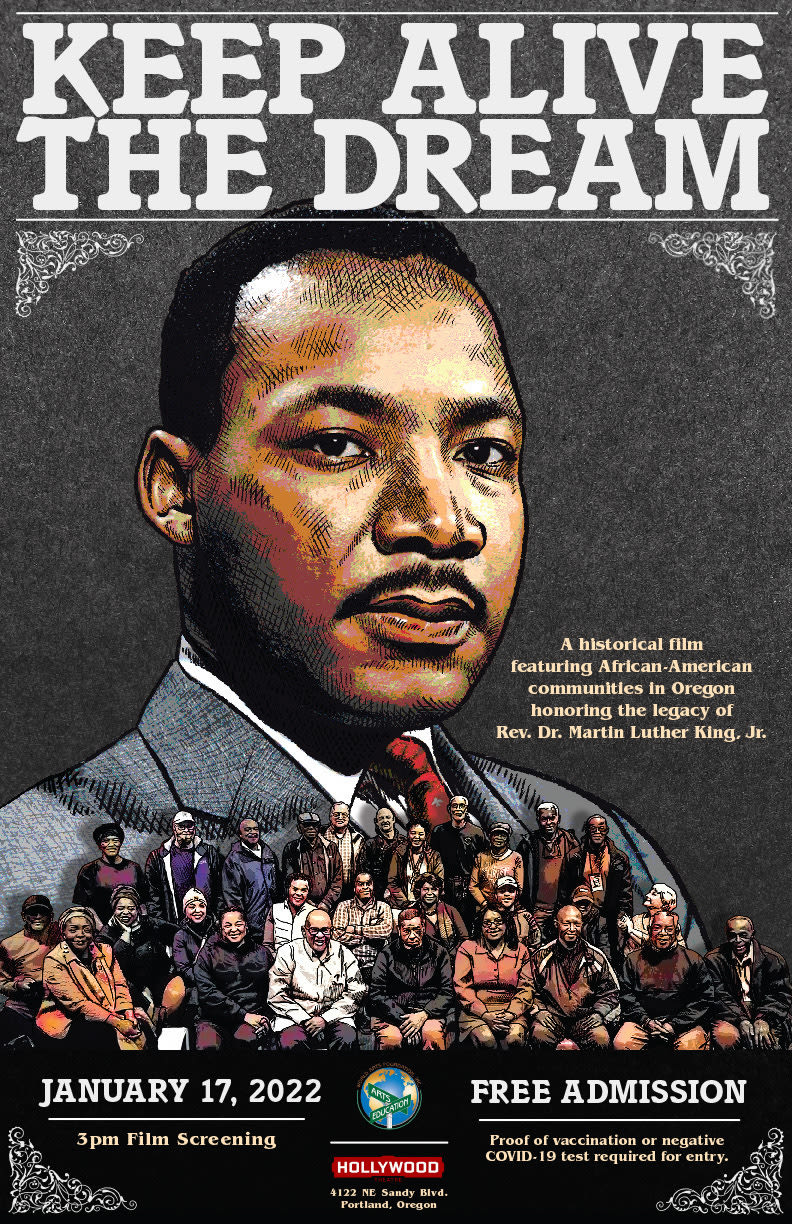A New Documentary Traces MLK's Legacy in Portland

Keep Alive the Dream is screening at the Hollywood Theatre on Monday, January 17, at 3 p.m.
Image: World Arts Foundation Inc.
Keep Alive the Dream, a new documentary from the Portland-based World Arts Foundation, is archiving the ways local Black communities have been celebrating Dr. Martin Luther King Jr.’s legacy for over 40 years.
In 1978 in a church basement, Black community leaders Ken Berry, Herb Cawthorne, and Michael Grice started an event honoring King’s legacy. Over the next four decades it grew into an all-day event produced by the World Arts Foundation featuring music, dance, speeches, community outreach, and BIPOC vendors, drawing thousands of participants every third Monday of January. Now, as large in-person events remain fraught, Keep Alive the Dream—directed by local filmmaker Elijah Hasan—revisits footage from those past decades of celebration and performance. The film will be screened for free at the Hollywood Theatre on Monday, January 17, at 3 p.m., along with showings the same day of the film online and a noon broadcast on KBOO.
“One of the things we've tried to do with this program all these years is to try to bring people together across all barriers, so people can see that we are one and we have to work together. Because if we're not, and we don't know our history—this is one of the things that Dr. King talked about—we are doomed to repeat it,” says Berry, a retired educator and executive producer at the World Arts Foundation.
Since the early days (the 1978 event came five years before the law creating a federal holiday for King's birthday), the World Arts Foundation’s MLK Day celebration has grown and transformed, adding more performers, speakers, and a vendor hall for community organizations and BIPOC artisans. The event has been held at local churches and schools, centering musical performances from what Berry calls the “unsung heroes” of Portland’s Black community, like gospel singer Willa Dorsey, jazz pianist Janice Scroggins, and soul group the Legendary Beyons.
“Many of them have passed on, but wanted to make sure that we acknowledge them for their contributions in the area of civil rights,” says Berry.
The performances in the film are artifacts of artists who didn’t always have the institutional access to cut records or tour nationwide. “These are marginalized musicians that didn't have a recording industry in Portland to support them,” says Bobby Smith, archivist for the World Arts Foundation.
Known for founding the Albina Music Trust and for his XRAY.fm radio show, Night School, which preserves and unearths Portland soul, jazz, disco, and funk, Smith has worked to uplift Black music for years. His work on Keep Alive the Dream is just one part of a larger project: the Albina Cultural Archive, an online database of film, photography, music, business cards, and newspaper articles, set to launch in a few months.
One group featured in Keep Alive the Dream is Berry’s own Youth Sound choir, a ’80s-era group of more than 100 students from across Portland, accompanied by a full band that includes Grammy-winning trumpeter Thara Memory. Albina Music Trust’s next release will be a vinyl recording, which was never released in its time, of Youth Sound performing at Jefferson High School in 1982.
In addition to music, Keep Alive the Dream includes reflections on historic injustice. Footage in the film shows the aftermath of the Vanport flood and Black-owned homes in Albina being demolished, and includes footage of Black community leader and former University of Oregon professor Herb Cawthorne reciting King’s “I Have a Dream Speech” at 1978's first World Arts Foundation MLK Day celebration. But primarily, the doc foregrounds the everyday experiences of Black Portlanders: speeches are played over archival images of people walking to work or fanning themselves in church pews, and of children playing in the park.
For Berry, the film is a reflection of how Black life in Portland has changed—he’s watched as youth performers in the film grew up and became artists, musicians, and community organizers in their own right.
After some four decades of "being a person very committed to family, and also committed to community, I think it's time to kind of move on," he says. "I'm trying to pass it on and leave this legacy.”
While this year’s MLK Day celebration may not be the eight-hour affair it was in years past, not everything has changed. At the Hollywood screening, there will still be live music and a post-film Q&A, moderated by Oregon state Sen. Lew Frederick. (The event will operate at 50 percent capacity and require proof of vaccination or a negative COVID test.)
“One person can make a great impact,” says Smith. “And a community of people, like this community that has been keeping alive this dream for many years, can make an even greater impact.”




